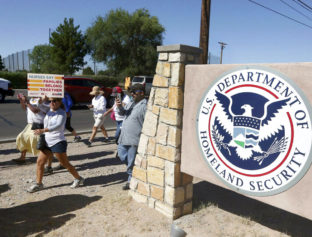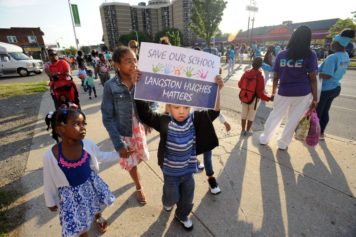In a stark illustration of a state’s disturbing priorities, Pennsylvania is forcing the Philadelphia schools to open in the fall without new books, paper, clubs, counselors, librarians, assistant principals, secretaries, sports, art and music—all to cover a projected $304 million budgetary shortfall. At the same time, the state found enough money to build a $400 million prison just outside the city.
In all, pink slips were sent to 19 percent of Philadelphia’s school-based workforce, including all 127 assistant principals, 646 teachers and more than 1,200 aides — basically everyone in each school who is not a teacher or principal.
While observers use words like “draconian” and “devastating” to describe the cuts, the blows to the Philadelphia schools keep coming: With 33 percent of its 200,000 students in charter schools, in March the district decided to close about 30 underused schools.
To protest the closures and the firing of 3,783 education professionals, two parents and two district employees began a hunger strike yesterday, camping out on the steps in front of Gov. Tom Corbett’s Philadelphia office. They say they will remain without food until the city and state governments move to reduce layoffs and improve student safety.
“I care about my daughter and grandson,” said hunger striker and parent Earlene Bly, the mother of a ninth grader and grandmother of an incoming first grader. “I am making this sacrifice to make sure they have safe schools. I am fasting to show my family and the city how serious this situation is.”
“I am worried sick,” school principal Lisa Ciaranca Kaplan told the New York Times. “How do I relieve teachers for lunch if I have no one in the lunchroom? I’ll be the only person in this building who’s not in a class.”
Kaplan’s Andrew Jackson School in South Philadelphia serves 410 students, speaking 14 languages, all of whom qualify for free meals.
“Do we just want a building that houses children until they get to the new prison they’re building?” she said.
The Times was there last Friday when Kaplan met with about 40 mothers and a few fathers to encourage them to read to their children over the summer. While it’s something schools generally encourage parents to do for all students, it was especially urgent this year for Kaplan since the district had eliminated summer school because of budget cuts.
“Make sure your children read and you read with your children,” Kaplan said as student helpers passed out donated coloring books and three Hannah Montana adventure books.
“I’m sorry if you have boys,” she said. “These were all I could get. They were free.”
State legislators voted to build a new prison outside of Philadelphia because the state corrections system is at about 105 percent capacity, meaning it’s overcrowded by about 2,705 inmates.
About a third of the state’s prisoners commit their crimes in Philadelphia County. But compared to other states, 105 percent capacity is not extreme—California’s prisons are at 137.5 percent capacity, while Illinois’ prisons are at 148 percent.
In addition, last year Pennsylvania saw the largest decrease in its prison population in 40 years—leading many observers to question the timing of building a new prison at a cost of $400 million when the Philly schools are $304 million in the hole.
Principals are contemplating opening in September with larger classes and no one to answer phones, keep order on the playground, coach sports, check out library books or send transcripts for seniors applying to college.
“You’re not even looking at a school that any of us went to,” said Lori Shorr, the mayor’s chief education officer. “It’s an atrocity, and we should all be ashamed of ourselves if the schools open with these budgets.”
While Philadelphia Mayor Michael A. Nutter and William R. Hite Jr., the first-year superintendent, continue to beg the state for more money to close the $304 million shortfall, after five trips to Harrisburg all they have received is a paltry $10 million.
“At this moment, there’s no obvious path to reach the outcome being sought by the Philadelphia School District,” Erik Arneson, a spokesman for the Republican majority in the Senate, told the Times.
It is important to note that state aid to Philadelphia schools declined by $274 million in the past three years, according to the Pennsylvania State Education Association.
“The state has never funded the city of Philadelphia and its schools very well,” said Michael Casserly, executive director of the Council of the Great City Schools. “For decades now it has been the subject of lawsuits and partisan politics and pushing and shoving, and the chickens are finally coming home to roost.”
The district made a long-delayed decision in March to close about 30 underused charter schools, over the objections of hundreds of protesters and Randi Weingarten, president of the American Federation of Teachers, who was arrested during a demonstration.
Mayor Nutter is scrambling to find more cash. In an effort to raise $95 million, he is looking to get $28 million from delinquent taxpayers and a $2 fee per pack of cigarettes is expected to raise $40 million. A bill to raise the alcohol tax, opposed by bar owners, stalled in the City Council.
“We are at a critical moment in terms of the future of this city,” said Mark McDonald, the mayor’s spokesman.

